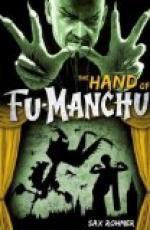It was this side of the court which lay in deepest shadow. By altering my position quite slightly I could command a view of the arched entrance on the left with its pale lamp in an iron bracket above, and of the high blank wall whose otherwise unbroken expanse it interrupted. All was very still; only on occasions the passing of a vehicle along Fleet Street would break the silence.
The nature of the danger that threatened I was wholly unable to surmise. Since, my pistol on the table beside me, I sat on guard at the window, and Smith, also armed, watched the outer door, it was not apparent by what agency the shadowy enemy could hope to come at us.
Something strange I had detected in Nayland Smith’s manner, however, which had induced me to believe that he suspected, if he did not know, what form of menace hung over us in the darkness. One thing in particular was puzzling me extremely: if Smith doubted the good faith of the sender of the message, why had he acted upon it?
Thus my mind worked—in endless and profitless cycles—whilst my eyes were ever searching the shadows below me.
And, as I watched, wondering vaguely why Smith at his post was so silent, presently I became aware of the presence of a slim figure over by the arches on the right. This discovery did not come suddenly, nor did it surprise me; I merely observed without being conscious of any great interest in the matter, that some one was standing in the court below, looking up at me where I sat.
I cannot hope to explain my state of mind at that moment, to render understandable by contrast with the cold fear which had visited me so recently, the utter apathy of my mental attitude. To this day I cannot recapture the mood—and for a very good reason, though one that was not apparent to me at the time.
It was the Eurasian girl Zarmi, who was standing there, looking up at the window! Silently I watched her. Why was I silent?—why did I not warn Smith of the presence of one of Dr. Fu-Manchu’s servants? I cannot explain, although later, the strangeness of my behavior may become in some measure understandable.
Zarmi raised her hand, beckoning to me, then stepped back, revealing the presence of a companion, hitherto masked by the dense shadows that lay under the arches. This second watcher moved slowly forward, and I perceived him to be none other than the mandarin Ki-Ming.
This I noted with interest, but with a sort of impersonal interest, as I might have watched the entrance of a character upon the stage of a theater. Despite the feeble light, I could see his benign countenance very clearly; but, far from being excited, a dreamy contentment possessed me; I actually found myself hoping that Smith would not intrude upon my reverie!
What a fascinating pageant it had been—the Fu-Manchu drama—from the moment that I had first set eyes upon the Yellow doctor. Again I seemed to be enacting my part in that scene, two years ago and more, when I had burst into the bare room above Shen-Yan’s opium den and had stood face to face with Dr. Fu-Manchu. He wore a plain yellow robe, its hue almost identical with that of his gaunt, hairless face; his elbows rested upon the dirty table and his pointed chin upon his long, bony hands.




